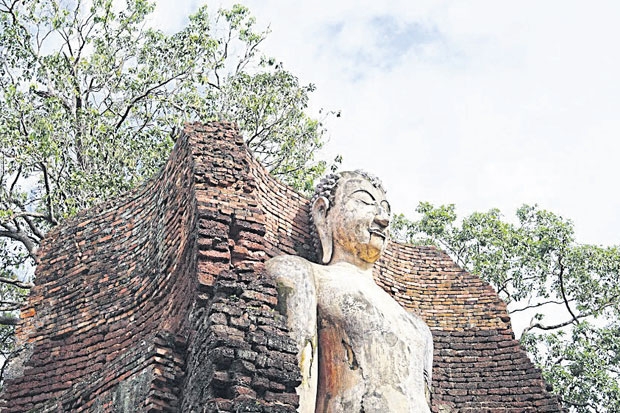Many people have taken trips to the historic cities of Sukhothai and Kamphaeng Phet, Thailand's "Dawn of Happiness" and "Diamond Wall" provinces. But to many tourists, there's a new treat waiting in your next visit -- a batch of local guides who will take you through the sites.
The idea, initiated by Unesco, is to get locals involved in raising conservation awareness while maintaining and developing their local communities.
Since their induction in 1991 as World Heritage Sites, Sukhothai and Kamphaeng Phet have become one of Thailand's most outstanding historical destinations. The majestic ancient ruins dating back to the 13th and 14th centuries receive millions of visitors each year, and in recent years Unesco has trained local people to become Cultural Heritage Specialist Guides, with their main duties being to safeguard the historical treasures while committing to their roles as hosts.
"Learning more about Kamphaeng Phet as a world heritage site in greater detail made me proud," said Patchara Poongason, a recent law graduate from Naresuan University who has joined the programme. "The appreciation and love I have for my hometown has become more profound. Plus, this makes me want to protect my hometown's valuable assets."
The local guides, who previously had a zero background in tourism, joined intensive training courses before they set out to work with tourists. All of the applicants have different backgrounds; some are fresh graduates, others are newspaper journalists, hotel personnel or television crew. Out of the 80 applicants, only 26 were selected into the project.
The difference between specialist guides and other tour guides is obviously to do with their local connection and their sense of ownership, which is fundamental in any effort to instil a belief in the value of conservation and sustainable tourism.
"It makes me realise the responsibilities that I have in protecting the condition of World Heritage sites because it isn't just for the tourism industry's profit," Wicha Chanchur, one of the specialists from Kamphaeng Phet, said.
Besides conserving ancient ruins, the idea is to spread the benefit of tourism to local communities. For instance, the specialists have linked the locals' private businesses into travel itineraries by taking visitors to Buddha amulet workshops and local sweet makers.
"The programme seeks the locals' participation as well," said Pattaya Oafrit, a former TV producer who's now a Unesco-trained cultural specialist. "We're part of the community, and we sense the potentials and get to pick activities that create impressive experiences for visitors. This is what makes us different from other guides. Only the locals can make visitors feel at home.
"Anyone can become a tour guide. But for them to successfully express their pride verbally to visitors, they ought to have a deeper understanding of their culture and history."
At the moment, the programme is conducted only in Thai, but the plan will be to introduce English-speaking guides too, although this will take some time.
Unesco has launched the Cultural Heritage Specialist Guide mainly in the hopes of raising conservation awareness for the future.
"[We chose] the locals because they are here and we want them to feel like they would benefit from the heritage and from the conserving of the sites," Tim Curtis, the head of the Culture Unit in Unesco Bangkok office, said. "What we want is to not just look at the conservation, but to understand it and know the reasons why it's a world heritage site and what the basic principles of conservation are; we don't just want ourselves and others to take one look at it and leave, which is what a lot of people do."
The programme is an adaptable framework to meet the needs of various countries and to augment the existing national guide certification schemes. It was first pioneered in Macau in 2005. Since last year, Unesco has been collaborating with ADB, Pata, Unescap, Dasta, the Department of Tourism of Thailand and the Fine Arts Department of Thailand to tweak the programme to fit Thailand's World Heritage sites. The creative solutions for conservation programmes have been successfully implemented in various countries such as India, Malaysia, Laos and Indonesia for over a decade now.

The River Ping in Kamphaeng Phet Province.


A Unesco study trip for the cultural heritage specialist guides.

